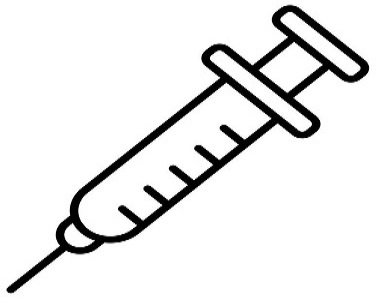Indications
Polysaccharide Pneumococcal Vaccine is a vaccine indicated for active immunization for the prevention of pneumococcal disease caused by the 23 serotypes contained in the vaccine (1, 2, 3, 4, 5, 6B, 7F, 8, 9N, 9V, 10A, 11A, 12F, 14, 15B, 17F, 18C, 19F, 19A, 20, 22F, 23F , and 33F). Polysaccharide Pneumococcal Vaccine is approved for use in persons 50 years of age or older and persons aged ≥ 2 years who are at increased risk for pneumococcal disease.
Pharmacology
Pneumococcal Vaccine induces type-specific antibodies that enhanced opsonization, phagocytosis, and killing of pneumococci by leukocytes and other phagocytic cells. The levels of antibodies that correlate with protection against pneumococcal disease have not been clearly defined.
Dosage And Administration
Preparation:
- Parenteral drug products should be inspected visually for particulate matter and discoloration prior to administration. If either of these two conditions exists, the vaccine should not be administered.
- Do not mix Pneumococcal Vaccine with other vaccines in the same syringe or vial.
- Use a separate sterile syringe and needle for each individual patient to prevent transmission of infectious agents from one person to another.
Single-Dose Vial: Withdraw 0.5 mL from the vial using a sterile needle and syringe free of preservatives, antiseptics, and detergents.
Single-Dose, Prefilled Syringe: The package does not contain a needle. Attach a sterile needle to the prefilled syringe by twisting in a clockwise direction until the needle fits securely on the syringe.
Administration:
Administer Pneumococcal Vaccine intramuscularly or subcutaneously into the deltoid muscle or lateral mid-thigh. Do not inject intravascularly or intradermally.
Single-Dose Vial: Administer a single 0.5-mL dose of Pneumococcal Vaccine using a sterile needle and syringe. Discard vial after use.
Single-Dose, Prefilled Syringe: Administer the entire contents of the single-dose, prefilled syringe per standard protocol using a sterile needle. Discard syringe after use.
Revaccination: The Advisory Committee on Immunization Practices (ACIP) has recommendations for revaccination against pneumococcal disease for persons at high risk who were previously vaccinated with Pneumococcal Vaccine. Routine revaccination of immunocompetent persons previously vaccinated with a 23-
valent vaccine, is not recommended.
Interaction
Concomitant Administration with Other Vaccines: In a randomized clinical study, a reduced immune response to ZOSTAVAX as measured by gpELISA was observed in individuals who received concurrent administration of Pneumococcal Vaccine and ZOSTAVAX compared with individuals who received these vaccines 4 weeks apart. Consider administration of the two vaccines separated by at least 4 weeks. Limited safety and immunogenicity data from clinical trials are available on the concurrent administration of Pneumococcal Vaccine and vaccines other than ZOSTAVAX.
Contraindications
Do not administer Pneumococcal Vaccine to individuals with a history of anaphylactic/anaphylactoid or severe allergic reaction to any component of the vaccine.
Side Effects
The most common adverse reactions, reported in >10% of subjects vaccinated with p neumococcal vaccine for the first time in a clinical trial, were: injection-site pain/soreness/tenderness (60.0%), injection-site swelling/ induration (20.3%), headache (17.6%), injection-site erythema (16.4%), asthenia and fatigue (13.2%), and myalgia (11.9%).
Pregnancy And Lactation
Pregnancy: All pregnancies have a background risk of birth defect, loss, or other adverse outcomes. In the U.S. general population, the estimated background risk of major birth defects and miscarriage in clinically recognized pregnancies is 2-4% and 15- 20%, respectively. Available human data from clinical trials of Pneumococcal Vaccine in pregnancy have not established the presence or absence of a vaccine-associated risk. Developmental toxicity studies have not been conducted with Pneumococcal Vaccine in animals.
Lactation: It is not known whether Pneumococcal Vaccine is excreted in human milk. Data are not available to assess the effects of Pneumococcal Vaccine on the breastfed infant or on milk production/excretion. The developmental and health benefits of breastfeeding should be considered along with the mother’s clinical need for Pneumococcal Vaccine and any potential adverse effects on the breastfed child from Pneumococcal Vaccine or from the underlying maternal condition. For preventive vaccines, the underlying maternal condition is susceptibility to the disease prevented by the vaccine.
Precautions And Warnings
Persons with Moderate or Severe Acute Illness: Defer vaccination with Pneumococcal Vaccine in persons with moderate or severe acute illness.
Persons with Severely Compromised Cardiovascular or Pulmonary Function: Caution and appropriate care should be exercised in administering Pneumococcal Vaccine to individuals with severely compromised cardiovascular and/or pulmonary function in whom a systemic reaction would pose a significant risk.
Use of Antibiotic Prophylaxis: This vaccine does not replace the need for penicillin (or another antibiotic) prophylaxis against pneumococcal infection. In patients who require penicillin (or another antibiotic) prophylaxis against pneumococcal infection, such prophylaxis should not be discontinued after vaccination with Pneumococcal Vaccine.
Persons with Altered Immunocompetence: Persons who are immunocompromised, including persons receiving immunosuppressive therapy, may have a diminished immune response to Pneumococcal Vaccine.
Persons with Chronic Cerebrospinal Fluid Leakage: Pneumococcal Vaccine may not be effective in preventing pneumococcal meningitis in patients who have chronic cerebrospinal fluid (CSF) leakage resulting from congenital lesions, skull fractures, or neurosurgical procedures.
Therapeutic Class
Vaccines, Anti-sera & Immunoglobulin.
Use in special populations
Pediatrics: Pneumococcal vaccine is not approved for use in children younger than 2 years of age because children in this age group do not develop an effective immune response to capsular types contained in the polysaccharide vaccine.
Geriatrics: For subjects aged 65 years or older in a clinical study systemic adverse reactions, determined by the investigator to be vaccine-related, were higher following revaccination (33.1%) than following initial vaccination (21.7%). Routine revaccination of immunocompetent persons previously vaccinated with a 23-valent vaccine is not recommended.
Storage Conditions
Store refrigerated at 2° to 8°C. Protect vials from light.
